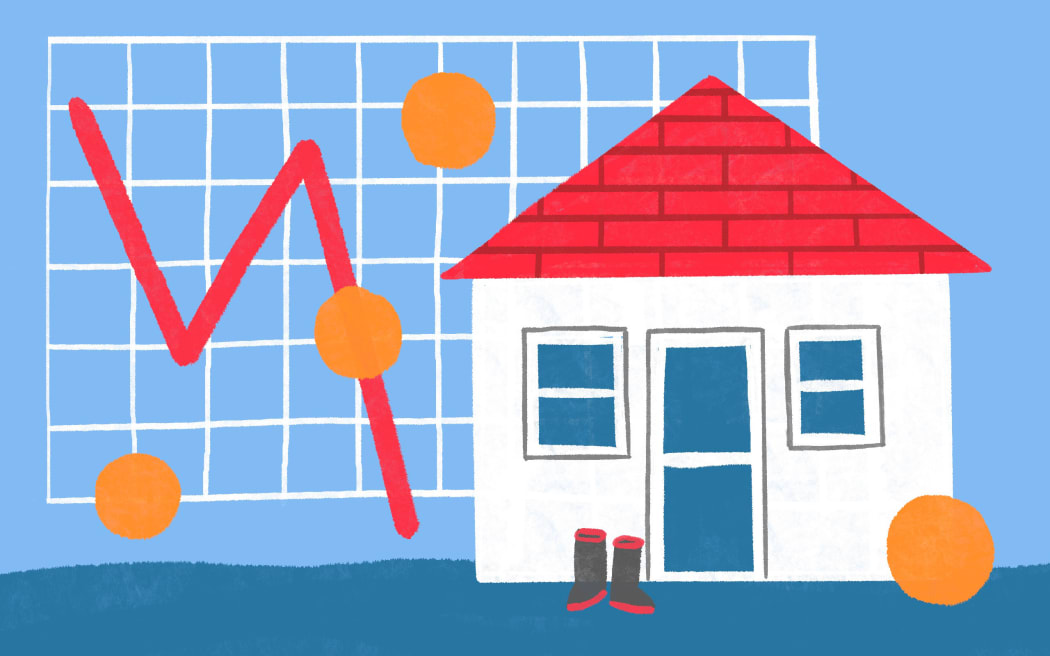Business
Housing Market Weakens as Economists Warn of Economic Stumble

Data from the Real Estate Institute of New Zealand (REINZ) reveals a struggling housing market, particularly in Auckland. According to the latest figures for July, seasonally adjusted sales counts dropped nationally, indicating a significant shift in the real estate landscape. The House Price Index, which accounts for fluctuations in median sale prices, showed a modest increase of 0.1 percent year-on-year but fell by 0.4 percent compared to the previous month. In Auckland, the index decreased by 0.1 percent annually and 1.8 percent month-on-month.
The data highlights a stark contrast in regional market performance. In Papakura, property values have plummeted by 5.2 percent since the beginning of 2024, while New Plymouth and Invercargill saw increases of 4.9 percent and 7.8 percent, respectively. This situation has drawn attention from economists, including Mike Jones, chief economist at BNZ.
Jones noted that the July figures confirm a decline in housing momentum. “It looks like if anything the housing market was a little weaker again in July,” he stated, indicating that Auckland’s performance is particularly concerning when compared to the South Island. He suggested that the recent unemployment data and the current state of the housing market provide further evidence of an economic “wobble” experienced during the middle of the year.
As household budgets tighten due to rising living costs, particularly food prices, demand in various sectors, including real estate, is faltering. Jones emphasized that many households feel “under siege” as wage growth slows down, creating additional financial pressure.
Market Outlook and Expert Insights
The outlook for the housing market remains uncertain. Analysts from ANZ pointed out that house prices are currently 0.4 percent above their most recent low from October 2024. They caution that recent market weaknesses may lead to a revision of their forecast, which anticipated a 2.5 percent year-on-year increase in prices by the end of 2025. ANZ economists advocate for three additional cuts to the Official Cash Rate (OCR) to stabilize the economy and inflation around the Reserve Bank’s target midpoint. They predict that lower interest rates could gradually strengthen the housing market over the coming year, although they do not foresee a rapid surge in prices.
Adding to this analysis, Michael Gordon, a senior economist at Westpac, described the market as unusually balanced. He noted that while lower mortgage rates have stimulated higher activity levels compared to last year, this demand is being met by an ample supply of homes entering the market. Consequently, there has been little upward pressure on sale prices.
Sales figures for July indicate a decline of 2.5 percent in seasonally adjusted terms, marking the third consecutive monthly decrease. Gordon anticipates that initial sales estimates often understate actual numbers, predicting a later revision that may show sales closer to flat. Year-on-year comparisons, while appearing more favorable now, are expected to diminish as the current year progresses.
In summary, the latest data underscores a challenging environment for the housing market in New Zealand, particularly in Auckland. As economic pressures mount on households, the outlook for real estate remains uncertain, with experts calling for interventions to boost stability and growth.
-

 World3 months ago
World3 months agoTest Your Knowledge: Take the Herald’s Afternoon Quiz Today
-

 Sports3 months ago
Sports3 months agoPM Faces Backlash from Fans During Netball Trophy Ceremony
-

 Lifestyle3 months ago
Lifestyle3 months agoDunedin Designers Win Top Award at Hokonui Fashion Event
-

 Sports3 months ago
Sports3 months agoLiam Lawson Launches New Era for Racing Bulls with Strong Start
-

 Lifestyle3 months ago
Lifestyle3 months agoDisney Fan Reveals Dress Code Tips for Park Visitors
-

 World3 months ago
World3 months agoCoalition Forms to Preserve Māori Wards in Hawke’s Bay
-

 Health3 months ago
Health3 months agoWalking Faster Offers Major Health Benefits for Older Adults
-

 Politics3 months ago
Politics3 months agoScots Rally with Humor and Music to Protest Trump’s Visit
-

 Top Stories3 months ago
Top Stories3 months agoUK and India Finalize Trade Deal to Boost Economic Ties
-

 Entertainment3 months ago
Entertainment3 months agoExperience the Excitement of ‘Chief of War’ in Oʻahu
-

 World3 months ago
World3 months agoHuntly Begins Water Pipe Flushing to Resolve Brown Water Issue
-

 Science3 months ago
Science3 months agoNew Interactive Map Reveals Wairarapa Valley’s Geological Secrets









